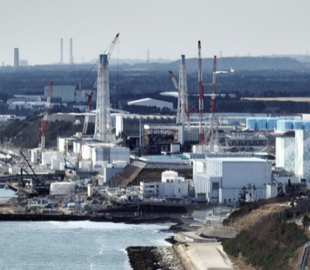
China and Japan have reached an agreement on the creation of an international mechanism for monitoring the process of discharging water purified from radioactive elements into the ocean from of the damaged nuclear power plant “Fukushima-1”, which will satisfy Beijing and make it possible to settle the dispute between the two countries.
This was reported by the Ministry of Foreign Affairs of the People's Republic of China, reports Ukrinform's own correspondent.
The ministry noted that the competent agencies of China and Japan recently held several rounds of consultations regarding the descent into the ocean “contaminated by nuclear weapons”. (this is what China calls purified water from a nuclear power plant – ed.) water from the Fukushima-1 nuclear power plant; and reached a number of agreements that will allow to settle the dispute between the two countries related to this operation.
The key element of the agreement is Tokyo's agreement to create within the framework of the International Atomic Energy Agency (IAEA) a mechanism for long-term international monitoring of key stages the descent of purified water from the nuclear power plant into the ocean, which will ensure the participation of China and other interested parties.
200% Deposit Bonus up to €3,000 180% First Deposit Bonus up to $20,000In particular, Chinese specialists and representatives of other countries participating in the mechanism will have the opportunity to conduct their own independent sampling of seawater near the Fukushima nuclear power plant, their laboratory analysis and comparison with the results of research by other participants. China's import of Japanese seafood, which Beijing introduced a complete ban on August 24 last year, the day of the start of the operation to discharge water from the Fukushima-1 nuclear power plant.
"After China takes substantial part in the long-term international monitoring under the IAEA, and the participating countries conduct independent sample analysis and other types of monitoring, China will begin to adjust the relevant restrictive measures and gradually resume imports of Japanese seafood, subject to their compliance with regulatory requirements and standards”, – noted the Ministry of Foreign Affairs of the People's Republic of China.
Before the ban, China was the largest market for Japanese seafood, which, according to the results of 2022, accounted for more than 40% of their exports from Japan, or about $600 million.< /p>
With Beijing's decision, the resumption of supplies to Hong Kong, the second largest buyer of Japanese marine products, sales to which will amount to about $540 million in 2022, is also connected.
Currently monitoring the state of the water near the destroyed The Fukushima nuclear power plant is operated by Tokyo Electric Power Co., its operator. (TEPCO) and the IAEA working group, which includes experts from about ten countries. Over a year of monitoring, no significant increase in the radiation background of seawater was detected.

